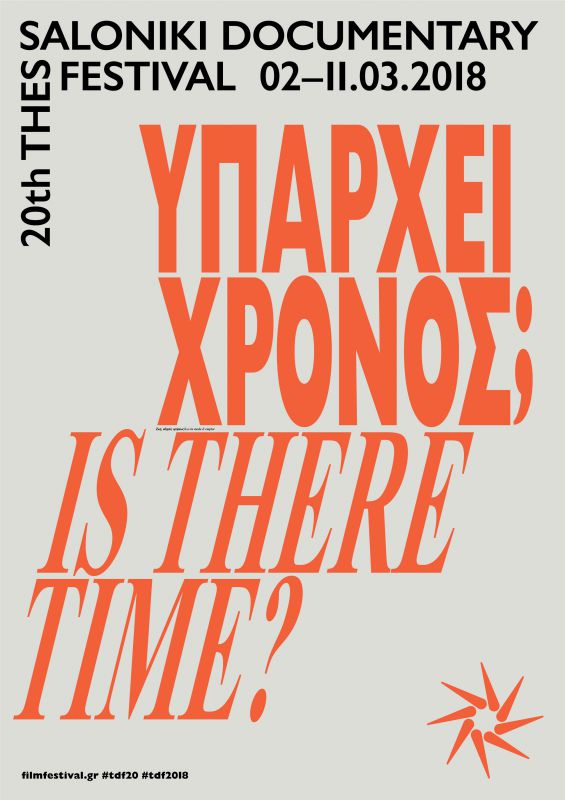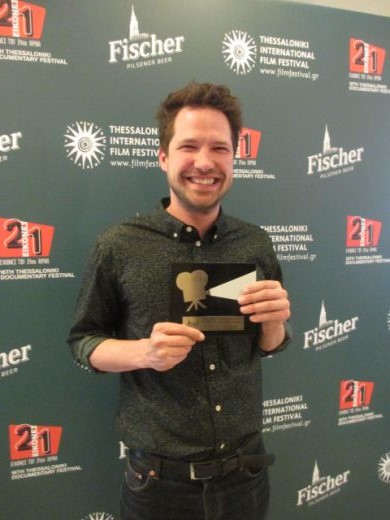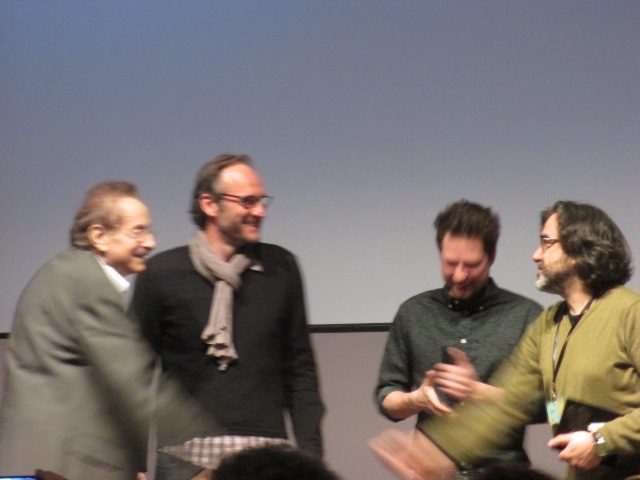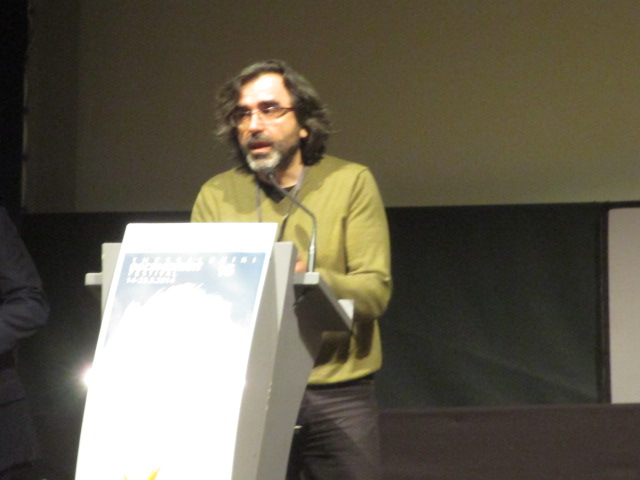|
|
||
|
Pro Tools
FILMFESTIVALS | 24/7 world wide coverageWelcome ! Enjoy the best of both worlds: Film & Festival News, exploring the best of the film festivals community. Launched in 1995, relentlessly connecting films to festivals, documenting and promoting festivals worldwide. Working on an upgrade soon. For collaboration, editorial contributions, or publicity, please send us an email here. User login |
A FUTURE WITHOUT OIL, interview with director Laetitia Moreau
A FUTURE WITHOUT OIL (France, 2010) by French director Laetitia Moreau is a 52’ documentary about President of Ecuador Rafael Correa and his fight with Ecuadorians against mass exploitation of oil from industrialized countries. An Ecuadorian scientific team goes on a three-year mission to raise multi-millions of dollars from US and Europe for a new form of energy development that would be more profitable than oil itself, according to their scientific studies. I interviewed Laetitia in Thessaloniki and we spoke at length on this issue. ME: Can you start by telling us a bit about your film, ‘A Future Without Oil’? Laetitia: I was living in South America. And I heard about this project of protecting the rainforests in Ecuador by not exporting the oil which is in this rainforest and I thought that it was such a crazy idea that if it was true I had to go and see it by myself and maybe make a film. ME: How long did it take you to make? Laetitia: Two years. ME: Was there a lot of footage at the end of filming?
Laetitia: Not so much because it was very long to get into the meetings with all the diplomats and all the governments and all the big NGO’s too so that part was a bit complicated. Many times I traveled with the team, the Ecuadorian team, and I wasn’t allowed to film so it was a risky footage in the sense for example I had the authorization of the World Bank to film and then I made all the travel to Washington and when I arrived they told me that the director of ME: Oh good! Scandal’s always good! Laetitia: And I said that wasn’t correct and I send an email saying I wasn’t allowed to film. Sorry for my English.. and then we had a negotiation that I can say for 15 minutes. So I did fifteen minutes and then they kicked me out. ME: So, you had meetings in the US then but they were not part of any investment program were they?
Laetitia: The part with the government it was no, I couldn’t film anything. But the part with the NGO there was this one sequence where we shoot in the World ME: So, what drew you to the situation in Ecuador as opposed to other countries?
Laetitia: Because from 2006, there is a new president, Rafael Correa, who is, I don’t know if I can say, Socialist.. He’s very progressive and he’s trying to ME: Well, if only more leaders could be like him. He’s very eloquent and educated.
Laetitia: Yes, I wanted to say yesterday but I forgot. This man is a PHD graduate, the highest degree you can get, in economy and development and he has ME: And he’s pretty young! Laetitia: And he’s around 40. ME: I like also when you said in the film about when the president went from being an ‘idealist’ to a ‘realist’ during the development of their eco anti-oil project during the course of the film.
Laetitia: I’m not sure if their project can be concretized because it’s very difficult. But it’s the first time in international discussion about climate ME: Of Course. And what happens to all the money they raised if they cannot pull this plan off? Laetitia: Well, I think it’s a project where they have to have a new kind of development and that’s the reason why it doesn’t work too because the rich country doesn’t want this kind of development for poor countries. They want poor countries to stay poor. ME: That was going to my next question. How does Europe feel when they weregiving this money to clean up America’s mess?
Laetitia: We do the same. The multinationals are from Europe and USA. We share the responsibilities. I wanted to say. There is this movie and there is a web
ME: Yes, well. The price is our lives. But anyway… I wanted to ask you if you’ve heard of a book call ‘Confessions of an Economic Hit Man’. It’s a very good
Laetitia: Yes, there was a coup last September because what Correa is doing is very very difficult. Because there is an oligarchy that is living from the money of the petrol since 40—50 years now and they don’t want any change so they don’t want any social policy, so there is an internal conflict in Ecuador. ME: Yes, well, the leaders of rich countries will do something when it is too late I imagine.
Laetitia: Yes, I met the indian economist Pavan Sukhdev in Copenhagen who said ‘when we will be obliged to wear oxygen masks to have to breathe, we will ME: And the world is so big now we need more oxygen than ever and all the time there is less and less. So, can you tell me, has this film been distributed yet?
Laetitia: Yes, this film was screened on TV. I started alone making these but as I was a reporter for many years for Canal Plus. And because I made two ME: And maybe there can be a part 2.
Laetitia: I think it was kind of general stuff in that time because we met a lot of Ecuadorian people in the area where there was the exploitation of Texaco ME: Incredible!
Laetitia: And I think that now with some other stuff we are doing the same. In Canada with this toxic gas that we are using now to make energy. It’s the same
ME: That’s why it’s so important to make films about these things, so the people can know. We all have so much to learn. How has your film been received
Laetitia: We have an international distributor in France called ZED and they sold the film so far to Canada, Spain, Switzerland and in France there was a ME: Well, with documentaries, it’s more the content and subject that are most important. Laetitia: Yes, but in France going through the red of the cinema you have to have something with nice images and nice sound and that’s other kind of work. ME: Well, that’s money. So, where is next for you? Are you going to more festivals with this film? Laetitia: Next week the film goes to Washington but I won’t go to Washington. And the funny thing is that it’s being screened at The World Bank. ME: Wow! Then you should be there.
Laetitia: [laughs] I wrote them a letter asking why they don’t invite me but they don’t. I don’t know. I hope that after this festival many people will want ME: And your next project? Laetitia: Yes, it’s about social issues in France. All over France. I don’t know if people from abroad are interested in seeing that but… ME: Well, I’m sure you’re wrong about that. A local issue is a universal one.
And then we continued to talk as we walked to our ‘Ouzo’ lunch we had been invited to down the street which consisted of great Greek food and Greek white
Read more about her film here: http://www.zed.fr/en/catalog/view/144
And see the related film here: www.canalplus.fr Enter: Doc Info: The Challenge.
Interview by Vanessa McMahon, March 17, 2011 19.03.2011 | Thessaloniki's blog Cat. : 11:59 A FUTURE WITHOUT OIL Amazon America Canada Canal PLus chauffeur Chevron Contact Details Copenhagen Director economist Ecuador energy Entertainment Entertainment Europe food France Harvard http://www.zed.fr/en/catalog/view/144 Human Interest Human Interest Illinois interview with director Laetitia Moreau Joel Berlinger Laetitia Moreau Next Magazine oil Pavan Sukhdev Person Career Person Location Person Travel president Quotation Rafael Correa Reporter Sheffield Social Issues Social Issues South America Spain Switzerland Technology Technology Texaco university of Illinois Vanessa McMahon Washington worker World Research Institute World Bank www.canalplus.fr
|
LinksThe Bulletin Board > The Bulletin Board Blog Following News Interview with EFM (Berlin) Director
Interview with IFTA Chairman (AFM)
Interview with Cannes Marche du Film Director
Filmfestivals.com dailies live coverage from > Live from India
Useful links for the indies: > Big files transfer
+ SUBSCRIBE to the weekly Newsletter Deals+ Special offers and discounts from filmfestivals.com Selected fun offers
> Bonus Casino
User imagesAbout Thessaloniki Mcmahon Vanessa Mcmahon Vanessa Vanessa McMahon Covered the 13th and 14th, and 16th edition. Through its tributes, it focuses both on discovering filmmakers with a unique cinematic point of view, and on the internationally recognized for their contribution to documentary. Contributions from Buno Chatelin http://tdf.filmfestival.gr/default.aspx?lang=en-US&loc=6&page=760 View my profile Send me a message My festivalThe EditorUser contributions |




























